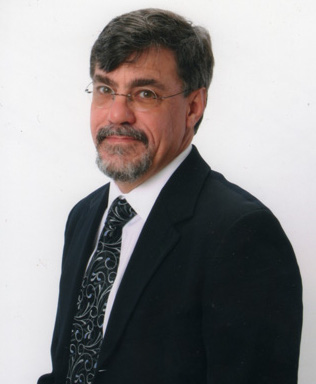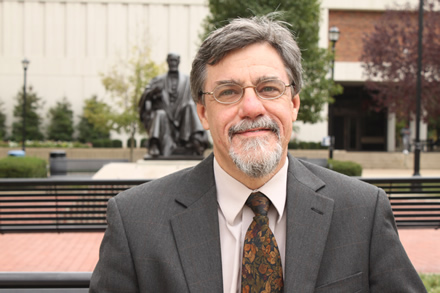As appearing in SOURCE

The new dean of Colorado State University’s College of Liberal Arts is an art historian and former department chair who has a track record in expanding and strengthening undergraduate programs, promoting multidisciplinary collaborations, fundraising, and supporting diversity and inclusion.
Benjamin Withers, associate provost for undergraduate education and dean of undergraduate studies at the University of Kentucky, will start at CSU July 1. He will succeed Ann Gill, who is retiring this spring after a 36-year career at CSU, including 11 as dean of the college.
“It’s going to be quite a challenge to follow in Dean Gill’s footsteps,” Withers said. “She’s set a high standard for her personal commitment to the college and the central role of the liberal arts in the university’s intellectual life. I hope to continue that leadership going forward.”
Withers was chosen from four finalists who interviewed on campus this spring. He says he was drawn to apply for the job in part because of the role CSU has played in hosting The Reinvention Center, an organization of research universities focused on strengthening undergraduate education.
“CSU is doing a particularly good job of leading this national discussion,” he said. “As I’ve learned more about CSU, I’ve been impressed with the university’s research productivity and the great potential of the College of Liberal Arts, especially the quality of the faculty and their commitment to their graduate and undergraduate students.”
Withers also lauded the efforts the college has made to promote collaboration among units on campus.
“It’s very fertile ground,” he said. “There’s a solid foundation here, with dedicated faculty and staff. Dean Gill has established a great legacy of leadership.”
“We are delighted that Dr. Ben Withers, an accomplished scholar with a wealth of administrative experience, has decided to join Colorado State as its next dean of the College of Liberal Arts,” said CSU Provost and Executive Vice President Rick Miranda. “He brings a dedication to our students, a commitment to scholarship, experience with shared governance issues, and a perspective on faculty contributions that will serve us well for many years. I look forward to working closely with him to continue progress in improving the College and its programs. We will certainly miss Ann Gill though, who has been an absolute pleasure to work with, a champion for our students and for the college, and a great University citizen in so many ways as well.”
Kentucky native
Withers was born in Lexington, Kentucky, and raised on a 200-acre farm north of there, outside Berry.
“My job after school and in the summer was working on the farm,” he said, adding that there weren’t many neighborhood kids to play with. “I developed a keen interest in reading as a way to discover more about the wider world.”
A two-time all-state musician in high school, he was offered several music scholarships before deciding on Carleton College, a small liberal arts college in Northfield, Minnesota, for his undergraduate studies. Memorable experiences during his undergraduate education included sneak performances in the college library — on the “dead” day before finals, when most students were studying.
“A friend and I would play a quick tuba duet in the library and then run out before they could catch us,” he recalls with a laugh.
His eventual academic passion wasn’t ignited until he took a medieval art class at Carleton.
“The first time I went to an art museum was at the end of that class, and it just captivated me,” Withers said. “After all, I’d grown up in rural Kentucky. I’d never visited a museum before. The experience helped me realize that you can learn so much about the wider world through art history. You can study the history of art through the lens of so many different disciplines, from economics to chemistry to the biography of the artist and other fields. It allowed me to ask questions from so many points of view, and pull them together at the same time.”
Graduate school
The faculty at Carleton, where he graduated magna cum laude in 1986, encouraged him to apply to graduate school, and art historian Michael Camille at the University of Chicago wrote him a personal letter inviting him to study there. Camille, one of the premier medieval art scholars in the world, served as a mentor to Withers before his death in 2002.
“I loved working with Michael,” said Withers, who earned his master’s and doctorate in art history there. “He encouraged people to look differently. He went beyond the traditional methods for understanding medieval art, which often focused on how it was produced, and instead asked questions about how art was received, the impact it had on the viewer and what messages about society the images helped create or subvert.”
After earning master’s and doctoral degrees in art history at the University of Chicago, his first faculty job was at Indiana University South Bend, where he taught a variety of courses and later served as assistant dean of the Ernestine M. Raclin School of the Arts. He was hired as chair of the Department of Art at the University of Kentucky in 2004, then served as director of the university’s Honors Program from 2012 to 2014. In that position, Withers was charged with developing a strategic vision for the program, broadening the array of classes taught, involving more faculty from across campus and doubling the number of students served.

As associate provost for undergraduate education and dean of undergraduate studies, he has helped lead the campus to historic highs in graduation rates and first-year retention rates. He oversaw a reorganization of the Division of Undergraduate Education, linking academic advising and career services and creating the Academy for Undergraduate Excellence, which emphasizes academic innovation and challenge for undergraduate students. Withers also contributed to UK’s general education reform efforts, developing innovations for UK Core, a program that received national accolades for its emphasis on creativity.
In the areas of diversity and inclusion, as department chair he worked with UK’s Office of Equity to revise faculty hiring processes, used cluster hires to boost multicultural diversity and supported the establishment of a Confucius Institute, where he helped establish a student exchange program with Shanghai University. He serves on the Advisory Board for Women in Executive Leadership and the President’s Unconscious Bias Initiative, which aims to foster an environment of inclusion.
Withers has also brought new resources to the units he’s served during his career, most recently working with UK administrators to secure the largest gift in the university’s history, a $23 million donation to endow the new Lewis Honors College.
“Ben has been an outstanding leader and passionate advocate for student success at all levels at the University of Kentucky,” said UK Provost Tim Tracy. “Our loss truly is the gain of another outstanding institution in Colorado State University. Ben has been at the forefront of incredible gains we have made in recent years in academic and student success. He will, I know, bring a true passion for students and lifelong learning to CSU.”
Objectives at CSU
Withers said his goals as dean of CSU’s College of Liberal Arts include building on the sense of community within the college and demonstrating the value of the liberal arts by creating opportunities to bring together multiple disciplines to discuss key issues of the day. He said these discussions must include science, technology, engineering and math (STEM) fields.
“STEM disciplines and the liberal arts need each other,” he said. “New technologies affect our daily lives and shift social and cultural patterns; changing those patterns demands new tools and inspires new discoveries. I’d like to promote an understanding of these interconnections as we move forward.”
Withers added that Fort Collins, like Lexington and other university cities, are examples of this mutually beneficial relationship. Fort Collins Mayor Wade Troxell recently visited Lexington to discuss that very issue as part of the University of Kentucky’s annual Lafayette Seminar in Public Issues.
“Both Lexington and Fort Collins do an excellent job of investing in the arts and encouraging innovation in the sciences,” Withers said. “The cities create conditions for mutual support, helping to attract students, faculty and staff who add to the cities’ cultural life and productivity. The city and the university both prosper as a result. What could be better than that?”
